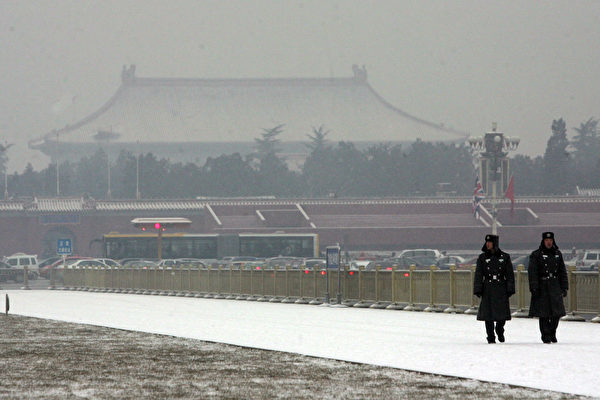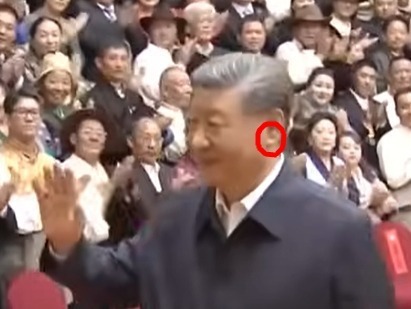Chinese paramilitary police stand guard at Tiananmen Square. (China Photos/Getty Images)
[People News] On August 27, the PLA’s official website and PLA Daily published an article titled Unceasingly Advance Political Army-Building, authored by Wang Qiang from the National Defense University Xi Jinping Thought Research Center. This was the fourth in the series “On Strengthening and Revitalizing the Military.” The military website highlighted the article in bold type, while PLA Daily placed it on page seven.
Interestingly, on July 12, 2024, Wang Qiang had also authored another piece titled Political Army-Building Is the Foundation of the People’s Army, likewise carried on page seven of PLA Daily. If one compares the two articles—both filled with Party-speak, clichés, empty talk, and falsehoods—one finds that, beyond stylistic differences, a key phrase present in the earlier piece has been deleted in the latest, and even the flattery toward Xi shows some changes.
In the 2024 article, one crucial line read: “Thoroughly implement all requirements of the Chairman responsibility system of the Central Military Commission, and resolutely follow Chairman Xi’s command, be accountable to Chairman Xi, and reassure Chairman Xi.” It also mentioned enshrining the “Chairman responsibility system of the CMC” into the Party constitution.
Yet in this year’s article, the wording merely states: “By strengthening the unified leadership of the CMC, ensure that the Party Central Committee, the CMC, and Chairman Xi firmly control and efficiently command the troops.” The slogans about “following Xi’s command, being accountable to Xi, and reassuring Xi” are gone, as is the mention of fully implementing the Chairman responsibility system.
Since the 19th Party Congress, Xi established himself as the “supreme leader.” Especially over the past three to four years, through purges and promotions, Xi tightened his grip over the military. During that period, the slogan “Follow Xi’s command, be accountable to Xi, reassure Xi” became a standard pledge of loyalty within the armed forces, even appearing on large plaques in military offices. This was a visible marker of Xi’s firm control of military power—despite undercurrents of discontent within the ranks.
After last year’s Third Plenum, rumors spread widely at home and abroad that Xi had suffered a stroke and lost control of the military. Believers pointed to evidence: Xi’s confidants in the PLA, such as Miao Hua and He Weidong, were either investigated or disappeared; expressions of loyalty to “Chairman Xi” were being downplayed in military meetings; CMC vice chairman Zhang Youxia openly avoided accompanying Xi on southern tours and trips to Tibet; Xi repeatedly skipped major military conferences; and television coverage of him at military events noticeably reduced close-up shots.
Skeptics countered that Xi was still prominently featured in state and military media, asking: if he had really lost power, would he still be given such treatment?
In reality, such maneuvers are not uncommon within the CCP, a Party shrouded in secrecy. To preserve authority, the CCP often maintains appearances while concealing shifts in power. Careful readers, however, can detect subtle but telling changes in official phrasing, which reflect real shifts behind the scenes.
As a researcher at the National Defense University’s Xi Jinping Thought Center, Wang Qiang would undoubtedly be aware of high-level shifts in the military and Party. The fact that his two articles differ in such a key phrase is itself an important signal. If the military is no longer required to “follow Xi’s command, be accountable to Xi, reassure Xi”, nor to implement the Chairman responsibility system, can Xi still be said to truly control the military?
The deletion of this line is not just editorial trimming—it conveys to the outside world that “Chairman Xi” may be little more than a title now.
Other differences also stand out.
Last year’s article began with effusive praise: Xi’s concept of “political army-building” was described as “the very foundation of the military,” “shining with the truth of Marxist military theory and methodology,” and something the troops must “fully study, comprehend, and resolutely implement.” It lauded Xi as a “Marxist statesman with a grand strategic vision.”
This year’s article is more subdued: it merely says Xi “has always prioritized political army-building, planned with foresight, elevated its theoretical level, and expanded its practical scope,” and that “we must stay sober and firm in tackling the unique challenges of a big Party, and unceasingly advance political army-building.” The exalted rhetoric is absent.
According to official descriptions, one key part of Xi’s “political army-building” has been tightening management of senior cadres and advancing anti-corruption at high levels. In 2024, Wang’s article stressed “resolutely fighting and winning the tough, protracted battle against corruption, deepening political rectification, reflecting on problems in loyalty, responsibility, views on performance, power, and the masses … focusing on the ‘critical few,’ with senior cadres leading by example.”
But this year’s piece omits references to the “critical few,” instead speaking vaguely of “strengthening oversight at key points of power execution.”
From the author’s perspective, PLA Daily carrying such a piece is unsurprising. Just the day before, on August 26, Zhang Youxia, at an academic seminar marking the 80th anniversary of the Anti-Japanese War, also avoided mentioning the CMC Chairman responsibility system. His perfunctory mention of “Chairman Xi” seemed merely for show.
Thus, on the eve of the early-September military parade, the PLA may well be sending a signal: Xi inspecting the troops is also little more than political theater.











News magazine bootstrap themes!
I like this themes, fast loading and look profesional
Thank you Carlos!
You're welcome!
Please support me with give positive rating!
Yes Sure!